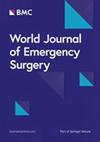Management of acute mesenteric ischaemia in adult patients: a systematic review and meta-analysis
IF 5.8
1区 医学
Q1 EMERGENCY MEDICINE
引用次数: 0
Abstract
Guidance on managing acute mesenteric ischaemia (AMI) is largely based on expert opinion and retrospective studies pooling different subtypes of AMI. In clinical practice, management strategy is often selected based on the patient’s severity of illness, whereas randomized controlled trials or even adjusted analyses comparing different strategies are rarely available. We aimed to perform a systematic review and meta-analysis on the effect of different management options when adjusted for the baseline severity of illness. A literature search was performed in PubMed, the Cochrane Library, Web of Science and Scopus. Studies recruiting patients after the year 2000, assessing at least 10 adult patients with reliably confirmed AMI, and comparing different management approaches were considered for inclusion. Thirteen study questions on different management strategies in different subtypes of AMI were formulated a priori. We included studies reporting results of adjusted analyses or reporting any variables reflecting the severity of illness in both study groups under comparison. A total of 3324 publications were identified, 321 were selected for full-text review and 31 included in the review and analysis. Most of the studies comparing different management strategies of AMI did not report the severity of illness in the groups under comparison. Any variable that could be considered to reflect the severity of illness was reported in 26 studies. The available data only allowed one meta-regression analysis comparing initial endovascular revascularization versus open surgery in arterial occlusive AMI, including four studies that reported white blood cell count and lactate. The results indicate that the significant advantage of the endovascular approach suggested in the crude analysis may be abolished when adjusting for the severity of the illness. Narrative summaries and raw data are presented for other research questions. The severity of illness plays an important role in the selection of management strategy and largely determines the outcome of any treatment, yet is generally not considered in available studies assessing the management of AMI. There is a major gap in the literature precluding appropriate analyses on treatment effects. Future studies should report subtypes of AMI and the severity of illness for each group. PROSPERO CRD42024568497, date of registration: July 20th, 2024成年患者急性肠系膜缺血的治疗:系统回顾和荟萃分析
急性肠系膜缺血(AMI)的治疗指南主要基于专家意见和回顾性研究,汇集了不同的AMI亚型。在临床实践中,通常根据患者病情的严重程度选择管理策略,而比较不同策略的随机对照试验甚至调整分析很少。我们的目的是对不同治疗方案的效果进行系统回顾和荟萃分析,并根据疾病的基线严重程度进行调整。在PubMed、Cochrane图书馆、Web of Science和Scopus中进行了文献检索。研究招募2000年后的患者,评估至少10例可靠确诊AMI的成年患者,并比较不同的治疗方法。针对AMI不同亚型的不同管理策略,先验地制定了13个研究问题。我们纳入了报告调整分析结果的研究,或报告了反映两组比较中疾病严重程度的任何变量的研究。共鉴定出3324篇文献,其中321篇入选全文综述,31篇纳入综述分析。大多数比较AMI不同治疗策略的研究没有报道被比较组的疾病严重程度。26项研究报告了任何可以被认为反映疾病严重程度的变量。现有数据仅允许一项荟萃回归分析,比较动脉闭塞性AMI的初始血管内重建术与开放手术,包括四项报告白细胞计数和乳酸的研究。结果表明,当调整疾病的严重程度时,在粗分析中提出的血管内入路的显著优势可能会被取消。叙述摘要和原始数据提出了其他研究问题。疾病的严重程度在治疗策略的选择中起着重要作用,在很大程度上决定了任何治疗的结果,但在评估AMI治疗的现有研究中通常没有考虑到疾病的严重程度。文献中有一个主要的空白,妨碍了对治疗效果的适当分析。未来的研究应该报告AMI的亚型和每组的疾病严重程度。PROSPERO CRD42024568497,注册日期:2024年7月20日
本文章由计算机程序翻译,如有差异,请以英文原文为准。
求助全文
约1分钟内获得全文
求助全文
来源期刊

World Journal of Emergency Surgery
EMERGENCY MEDICINE-SURGERY
CiteScore
14.50
自引率
5.00%
发文量
60
审稿时长
10 weeks
期刊介绍:
The World Journal of Emergency Surgery is an open access, peer-reviewed journal covering all facets of clinical and basic research in traumatic and non-traumatic emergency surgery and related fields. Topics include emergency surgery, acute care surgery, trauma surgery, intensive care, trauma management, and resuscitation, among others.
 求助内容:
求助内容: 应助结果提醒方式:
应助结果提醒方式:


